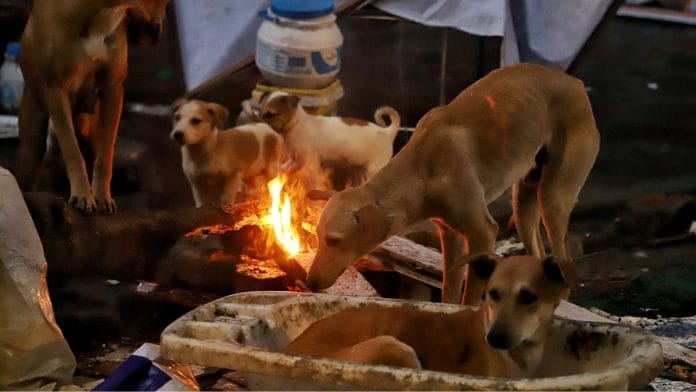New Delhi: Activists in Delhi have seen an opportunity to advance animal rights with the upcoming elections in the national capital. They have put together a manifesto directed at political parties, pushing to make the welfare of animals part of the political agenda. This is the first time such a comprehensive document has been put forward, they claim.
The manifesto, titled ‘IMPRESS’—an acronym for Improve, Prohibit, Regulate, Sympathise, and Strengthen—lists a series of demands, including improving the conditions of the “dilapidated” veterinary hospitals and shutting down illegal slaughterhouses.
It was created by the Animal Law Cell of Delhi University’s Faculty of Law, independent activist Manu Singh, and the private NGO People for Animals, Wilderness and Sustainability (PAWS). The Animal Law Cell first published it on their social media accounts on 19 December 2024.
Speaking to ThePrint, Vipul Jain, a member of PAWS and one of the manifesto’s authors, said, “This is the first time we’ve approached political parties and sought to include animal rights as part of the electoral campaign.”
The activists approached representatives of the Bharatiya Janata Party (BJP), Aam Aadmi Party (AAP), and the Congress, providing copies of the manifesto and urging them to work towards improving animal welfare.
On the PAWS social media handle, for instance, there are videos and images of activists presenting the manifesto to BJP’s Virendra Sachdeva and Ajay Maken of Congress—both of whom assured them that necessary action would be taken.
“We are not affiliated with any party, we just want whoever comes to power to also work for the helpless animals and stop cruelty,” Jain added.
Earlier, the complaints brought to politicians used to be very issue-specific, according to Rohit Bhardwaj, an independent animal welfare advocate and another one of the authors of the manifesto.
However, with this manifesto, the activists are trying to push political parties to include animal welfare in their activities as a broader public good and stop the “unimaginable cruelty on animals” in the city, and the country as a whole. This comes ahead of the Delhi Assembly elections scheduled for 5 February, with results due on 8 February.
Also read: Stray dogs don’t ‘charge to kill’, ‘plot to poop’. So-called menace is a human-made problem
‘Lukewarm response from political parties’
Under the five categories, the manifesto lays out directions for political parties, calling on them to “Impress us to get our votes.” For instance, under the ‘Sympathise’ section it calls for workshops to be conducted for animal welfare in communities.
Likewise, it urges those in power to “improve” dilapidated veterinary hospitals and “the existing wildlife sanctuary”; “prohibit animal pulled carts in Delhi”; “regulate pet shops”; and “strengthen existing penalties” to prevent animal cruelty, adding that “Delhi deserves better.”
“The rules are already in place. We just want the government to regulate them and implement them better,” said Bhardwaj.
If there were a world wherein Animals were in a position of actually being heard this is what they would demand. ✍️
Animal Law Cell, Faculty of Law proudly presents the Animal Manifesto 2025 ?#facultyoflaw #universityofdelhi #animalrights #india #animalcruelty #animallawcell pic.twitter.com/oeCyHiPtKy
— Animal Law Cell, Faculty of Law, Delhi University (@animallawcell) December 19, 2024
Since late December, the guidelines have been circulating on social media, where they have received support from several of Delhi’s residents.
According to Bhardwaj, through the manifesto, the authors are advocating that residents “Vote for Compassion”, urging them to support representatives that will ensure action for animal rights. Concerned residents have taken to tagging the official accounts of political parties to draw attention to these manifestos.
However, according to Jain and Bhardwaj, the response from the actual political parties has been lukewarm at best.
“As yet, there has been no mention of our demands or manifesto in either of the parties’ official positions,” said Bhardwaj. “It is important because this is the first time we’ve compiled and presented such a comprehensive document.”
(Edited by Sanya Mathur)
Also read: Dogs on Goa beach. A new exhibition asks a question about who belongs and who’s adrift







Animal rights activists should take ownership of these stray dogs. Instead of pontification, they should establish centres where these dogs are kept, fed and taken care of.
Stray dogs are an absolute nuisance across India. And they pose grave risk to children. There have been so many instances lately of children being mauled to death by packs of stray dogs.
Those whose hearts bleed for stray dogs should keep these dogs as their pet in their homes.
The Municipal authorities across cities must initiate sterilisation efforts on a war footing. If necessary, these stray dogs should be culled.
Delhi must take immediate steps either cull or relocate stray dogs from residential areas.
Stray dogs are a serious threat to rhe safety and well being of the residents of Delhi. As it is, many children have died due to attacks from such stray dogs. There should not be any compromise on this issue.
The animal rights loony brigade should be taken to task and held responsible for the deaths caused by stray dogs.
Stray dogs are a menace in all Indian cities. They pose grave danger to the safety and well being of citizens. Worse still, they are a serious threat to the life of toddlers and senior citizens. Over the last few years, there have been hundreds of cases where little children and aged seniors have died due to mauling by packs of stray dogs. Hundreds have had their faces disfigured due to attacks from such dogs. At times, even pet dogs, let loose by the owners, cause severe damage to people – usually passers by or those out for a morning walk.
As such, it is of utmost importance that stray dogs are culled across the nation. Else sterilised and relocated to jungles.
Stray dogs are not and cannot be a part of human society and civic spaces in our cities. They are an omnipresent threat and must be dealt with as such.